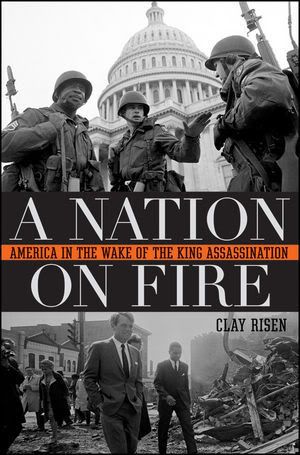 The topic below was originally posted on my blog, the Intrepid Liberal Journal.
The topic below was originally posted on my blog, the Intrepid Liberal Journal. Tomorrow, America honors the birthday of heroic civil rights activist Martin Luther King. Americans revere King across the political and ethnic spectrum for his wisdom, idealism, courage and practice of non-violent civil disobedience against the forces of racial oppression. Thanks in large part to the trailblazing efforts of King and his followers; America inaugurates its first black president the very next day when Barack Obama takes the oath of office on January 20th. Yet even as Americans celebrate the historical arc from Martin Luther King to Barack Obama, the scars of racial injustice remain woven into our country’s fabric.
Understandably, historians have overlooked the immediate aftermath of King’s assassination in a Memphis, Tennessee hotel on April 4th, 1968. The meaning of King’s life as well as the tragedy his loss represented has received considerable attention from historians and the body politic. Yet the immediate aftermath of King’s death was dwarfed by his iconic life as well as the assassination of Robert Kennedy and the violence that took place during the Democratic National Convention later that year.
Clay Risen, author of A Nation On Fire: America In the Wake of the King Assassination (John Wiley & Sons) argues that what transpired immediately after April 4th impacted America as intensely as King’s death itself. Within hours, there was rioting in Washington D.C. and before the violence subsided, the U.S. Army occupied three major American cities while National Guard units patrolled a dozen more. Overall, there were disturbances in nearly 120 cities. Ultimately, the riots helped facilitate forty years of conservative hegemony as urban America reaped the whirlwind of white resentment and indifference.
Risen specifically chronicles the period covering President Lyndon Johnson’s withdrawal from the 1968 campaign on March 31st, to King’s assassination on April 4th and culminates with Johnson’s signing of the 1968 Civil Rights Act on April 11th. The author relies on dozens of interviews as well as newly declassified documents to provide a dramatic day-by-day, city-by-city narrative of the riots, from the looting in Washington to violence in Chicago, Baltimore and other cities following King's death in Memphis.
Indeed, Risen skillfully takes the reader on a historical tour with larger than life personalities like the militant Stokely Carmichael to white racist vigilantes in Baltimore and political figures such as New York City Mayor John Lindsey, Chicago Mayor Richard Daley, New York Senator Robert Kennedy and Maryland Governor Spiro Agnew. Perhaps the book’s most dramatic anecdote was when a young Deputy Attorney General named Warren Christopher, joined General Ralph Haines, and Public Safety Commissioner Patrick Murphy at a Washington DC gas station pay-phone to recommend to President Johnson that he deploy federal troops in the nation’s capitol.
George Pelecanos, author of The Turnaround and The Night Gardner issued the following praise for Risen’s book:
“Clay Risen’s A Nation on Fire is the long-awaited definitive account of one of the most important, underreported events of the 1960s. As important for its historical aspect as it is for understanding where we are today, it is an exciting, important document, excitingly told.”Risen, was formerly an editor at The New Republic and is the founding Managing Editor of Democracy: A Journal of Ideas. He has also contributed to Smithsonian, Slate, the Atlantic, and the New York Times Sunday Magazine. Risen agreed to a telephone interview with me in a podcast format about his book as well as the fateful days following King’s death. Our conversation was just over forty-seven minutes. Please refer to the flash media player below.
Either searching for the Intrepid Liberal Journal or Robert Ellman can also access this interview at no cost via the Itunes Store.